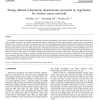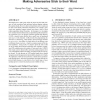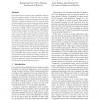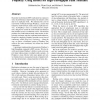53 search results - page 10 / 11 » Evaluating Byzantine Quorum Systems |
114
Voted
DSN
2006
IEEE
15 years 8 months ago
2006
IEEE
Randomized agreement protocols have been around for more than two decades. Often assumed to be inefficient due to their high expected communication and time complexities, they ha...
137
click to vote
COMCOM
2006
15 years 1 months ago
2006
In this paper we consider a distributed and efficient information dissemination and retrieval system for wireless sensor networks. In such a system each sensor node operates auton...
140
Voted
SOSP
2007
ACM
15 years 10 months ago
2007
ACM
Researchers have made great strides in improving the fault tolerance of both centralized and replicated systems against arbitrary (Byzantine) faults. However, there are hard limit...
115
click to vote
FAST
2009
14 years 11 months ago
2009
Fault-tolerant services typically make assumptions about the type and maximum number of faults that they can tolerate while providing their correctness guarantees; when such a fau...
122
click to vote
NSDI
2010
15 years 3 months ago
2010
Byzantine fault-tolerant (BFT) replication has enjoyed a series of performance improvements, but remains costly due to its replicated work. We eliminate this cost for read-mostly ...




